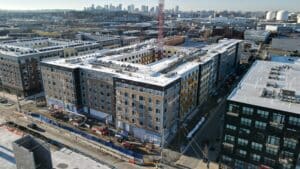
The inner suburbs comprise 15 percent of all current apartment construction in Greater Boston, according to research from Colliers and CoStar Group. Greystar’s 384-unit Maxwell complex, under construction at 85 Boston St. in Everett, is scheduled to open in late 2024. Photo courtesy of Greystar
Apartment vacancies rose to their highest levels in three years as developers delivered 8,700 units in eastern Massachusetts during the past year.
Only 6,900 apartments that delivered in 2023 were absorbed, Colliers reported, as the vacancy rate rose to 4.9 percent. Asking rents were essentially flat at $3.04 per square foot, while landlord concessions reached their highest level in 10 quarters.
“As fundamentals have weakened, rent growth has stalled,” Colliers researchers wrote in the fourth-quarter multifamily report.
Several year-end reports released in recent days indicate an easing of the steep rent increases that took place immediately following the pandemic.
Rents at high-end properties in Boston, Brookline and Cambridge rose 4 percent over the previous year, less than half the rate of increases during the two previous years, The Collaborative Cos. reported. Average rents ended 2023 at $3,934, or $4.86 per square foot.
AvalonBay Communities, which owns nearly 9,600 apartments in New England, last week reported 5.1 percent rent growth during 2023 bringing average monthly rates to $3,358. New England has the second-highest rents in the company’s portfolio, trailing only the New York City and suburban New York markets.
The relief for renters in one of the nation’s least affordable housing markets could be short-lived, particularly in the urban core.
“Even with strong demand and record high rents, developers are having a hard time seeing the benefits outweigh the financial risk of initiating new construction projects. This has further imperiled efforts to address the housing shortage, exacerbating the supply issues and driving prices up,” TCC’s report stated.
There are currently no major apartment developments under way in neighborhoods such as downtown, Back Bay and the Seaport, Colliers noted. The inner suburbs represent the busiest submarket for new construction, comprising 15 percent of the total new supply.
And Equity Residential, one of Greater Boston’s largest apartment landlords said high mortgage rates are keeping tenants out of the home ownership market longer and drove a 7 percent increase in its Boston-area rents during 2023. Greater Boston’s rents are already the second-highest in the company’s portfolio after New York, ending the year with an average monthly rate of $3,422.








